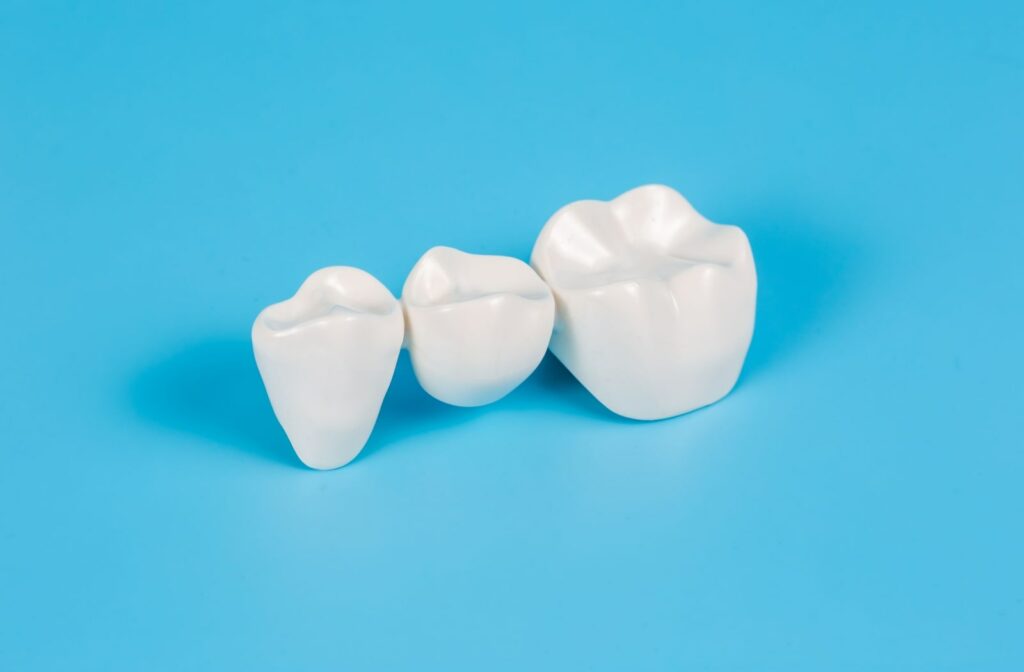A radiant smile can light up a room, and much of that brilliance hinges on the health and appearance of our teeth.
A porcelain dental crown stands out among the many available treatments for restoring dental health for its versatility and natural-looking results. Porcelain crowns provide aesthetic appeal, durability, and biocompatibility to minimize adverse reactions.
There isn’t always a one-size-fits-all answer to any restorative dentistry procedure as each situation has unique needs. Your dentist can review the best options for restoring your smile, along with the ideal material that combines utility and aesthetics.
Why Get a Dental Crown?
It’s important to grasp the purpose of a dental crown to understand its significance. Dental crowns are prosthetic devices shaped like a tooth and are used to cover or encase a damaged or decayed tooth. They are typically available in several materials, such as metal, ceramic, resin, and porcelain.
They offer a protective cover that improves your teeth and restores their function. Crowns can be excellent solutions for weak, discoloured, or misshapen teeth and are a staple in various dental procedures, from root canals to dental implants.
What Are Porcelain Dental Crowns?
Porcelain dental crowns are caps made of a durable, tooth-coloured porcelain material designed to mimic your teeth’s natural look and function. They are typically placed over a tooth with extensive structural damage, providing a resilient, aesthetically pleasing solution.
With advancements in materials and techniques, porcelain crowns have become a go-to choice for many individuals looking to restore their teeth without compromising appearance.
Advantages of Porcelain Crowns
Choosing a porcelain crown comes with several advantages.
Aesthetic Appeal
One significant benefit of porcelain dental crowns is their ability to blend seamlessly with natural teeth. The translucent properties of porcelain make it an ideal choice for creating a radiant, lifelike restoration. Patients can smile confidently, knowing their dental work is virtually indistinguishable from their natural teeth.
Durability
Porcelain crowns are renowned for their durability, often lasting for many years with proper care. The material is resistant to wear and can withstand the forces of chewing and biting, offering restored functionality along with its aesthetic benefits.
Biocompatibility
Porcelain is a biocompatible material, along with other ceramic and non-metal materials, meaning it’s well-tolerated by the human body and typically less likely to cause adverse reactions. This biocompatibility makes it a safe option for most patients, providing a comfortable and healthy restoration.
Common Uses of Porcelain Crowns
Porcelain dental crowns have a wide application range in restorative and cosmetic dentistry. They are commonly used to:
- Protect a weak tooth from further decay or breakage
- Cover and support a tooth with a large filling where there isn’t much tooth left
- Restore a broken or severely worn tooth
- Anchor a dental bridge
- Cover misshapen or severely discoloured teeth
With such varied uses, porcelain crowns are a versatile solution for many dental concerns.
The Procedure for Placing Porcelain Crowns
Getting a porcelain dental crown usually involves multiple visits to the dentist. The process may vary slightly between dentists, but you can generally expect to encounter the following steps:
The First Visit
During the first visit, your dentist prepares the tooth that will receive the crown by reshaping it to create space for the crown. Then they can take an impression of your tooth to ensure the proper fit of your custom crown. In many cases, a temporary crown is placed over the prepared tooth to protect it until the permanent crown is ready.
The Final Fitting
When your custom crown is ready, you will return to the dentist for the fitting. Your dentist can make adjustments to ensure a proper bite and fit before permanently cementing the crown in place.
Aftercare
After the crown is secured, you may experience some sensitivity, which should subside in a few days. It’s important to maintain good dental hygiene to care for the crowned tooth and surrounding gums. Always follow your dentist’s recommendations and guidelines following the procedure.
Comparing Porcelain Crowns with Other Types
Dental crowns can be made from a variety of materials, each with its own set of advantages. For example, porcelain crowns offer a more natural appearance compared to metal crowns, but they may not be as strong.
Ceramic crowns are similar to porcelain and are also tooth-coloured but may be less durable. Composite crowns are the most affordable option, but they are also less resilient and are prone to staining over time.
Discuss Your Crown Material Options with Your Dentist
Porcelain dental crowns offer a winning combination of natural aesthetics and reliable performance. But they may not always be the best option for your unique situation. Your dentist can recommend the ideal material after examining your mouth and the tooth, or teeth, that need a crown.
Contact us at Hill Top Dental Centre today to book an appointment and take the first step to a more confident smile. One of our experienced dentists can review your options with you and explain the advantages and disadvantages of each.



